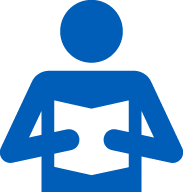Self-employment for people with disability

Download the 'Self-employment for people with disability' PDF guide (238.41 KB)
Download the ‘Self-employment for people with disability' DOC guide (1.03 MB)
Download the Easy Read ‘Self-employment for people with disability' PDF guide (1.46 MB)
1. Overview
This guide provides information on:
- what self-employment is
- the benefits of self-employment
- the challenges of self-employment
- government programs and supports for self-employment.
2. Introduction
Self-employment is a path to financial independence for many people with disability. It allows people to arrange their work based on their needs, skills and interests.
According to research by the University of Technology Sydney (UTS), people with disability have a 40% higher rate of self-employment and entrepreneurship than people without disability.[1]
3. What is self-employment?
Self-employment means working for yourself. A self-employed person supplies products or services to customers who pay them directly.
Self-employed people can also be called small business owners, independent contractors or freelancers.
Self-employed people work in many different occupations. For example, a self-employed person may be a:
- writer
- artist
- photographer
- lawyer
- accountant
- hairdresser
- plumber
- electrician
- barista
- clothing designer
- landscaper
- carpenter
- consultant.
Case study
Running a successful manufacturing business
Andrew Meddings is self-employed. He owns a successful pool manufacturing business in Sydney. He employs four staff and several contractors. He has lived with a spinal cord injury since a motorbike accident in 2000.
Speaking to the ABC in June 2020, Andrew reflected on his experience of arriving at a job for a new client.
“Someone had recommended me and [the client] had heard great things about my work … When I turned up he said: ‘Jeez, John said your work was amazing, but he didn’t say anything about you being in a wheelchair.” [2]
Andrew was pleased that the new client was surprised he was in a wheelchair. This meant that the quality of his work was more important to the client than his disability.
4. Benefits of self-employment
People can benefit from self-employment in different ways. Some benefits include:
- Controlling where you work—You can work from an office, a café or your own home.
- Deciding when you work— Flexible work hours can help you manage in-home support, appointments and caring responsibilities.
- Choosing who you work with—You can choose who you work with, including co-workers and clients.
- Pursuing a passion or creative interest—You can follow your passions and interests in any way you like.
Case study
Adam’s Apple
Adam established his own business called ‘Adams Apple’. Adam has autism. He approached Food Connect Sydney with the idea of delivering food boxes to people’s houses. He picks up the boxes from the warehouses and delivers them to customers.
Adam has been running his business successfully for over 10 years.
For more information about Adam and his self-employment journey, see these pages:
5. Challenges of self-employment
Self-employment can also be a challenge. Some potential issues include:
- Larger range of duties—You will have to manage your business. You will need to consider marketing, insurance, taxes, buying supplies and more. See Section 6 below for more details on this.
- Financial uncertainty—When self-employed, you will not receive a regular salary. Your wages depend on the success of your business. Workload changes may lead to financial uncertainty. There can be delays between providing a service to a customer and receiving a payment. The payment for your work may take up to 60 days.
- Self-motivation—You must be motivated. You will not have anyone telling you what to do or when to do it. You will be responsible for managing your work and meeting client or customer deadlines.
6. Considerations when thinking about self-employment
When weighing up the benefits and challenges of self-employment, consider the following questions:
-
How will you manage the administration and accounting side of your business?
You may be good at your work but need to gain skills in accounting, tax and business administration. You can learn these skills before you get started, or you can hire someone else to do it.
-
How will you promote or market your business?
It is important to advertise your products or services and tell people how to buy them.
Consider creating a website and/or social media accounts to share your products.
-
What type of business insurance do you need? Are there any specific registrations or licences you may need for your business?
Under law, some businesses need to have certain types of insurance and licences. Other types of insurance are your choice but can be important for protecting your business.
-
How will you protect your financial security?
This is especially important when you are starting your business or when business is slow.
A few words from Ambassador Tim Ferguson
“I’m self-employed, so have worked to create employment that suits my condition. I maintain a career touring live shows and making movies.
Travelling in a wheelchair creates some challenges, but with preparation and persistence, these can be overcome.
Employment has always created a positive effect on my psychological well-being. It means engaging with new people and overcoming challenges. Sometimes I have to change my plans because of my evolving condition, but I work with a brilliant team of professional colleagues and carers.”
Tim Ferguson
Comedian/Screenwriter, Stella Rose Productions
IncludeAbility Ambassador
7. Government programs and supports
Self-employed people may be eligible for certain government programs or support services.
Here are some suggested resources.
7.1 Business.gov.au
Business.gov.au provides information, services and support to help businesses succeed in Australia.
It has various tools and resources, including a guide to starting a business that walks you through each step and helps you plan for the future.
It has information about grants and other funding opportunities available for new businesses, including the Entrepreneurs' Programme.
The website also has information on business registrations and licenses.
7.2 Self-Employment Assistance
Self-Employment Assistance is a government program that helps people interested in self-employment start and run businesses. It also helps current business owners adjust their businesses to remain successful.
Self-Employment Assistance offers six tailored, flexible services that eligible participants can choose from, including:
- exploring self-employment workshops
- free accredited small business training
- business plan development
- business advice sessions
- business health checks
- small business coaching.
You can find your local Self-Employment Assistance providers using the Workforce Australia provider search function.
7.3 Moneysmart
Moneysmart helps Australians take financial control of their lives. It has information on self-employment in its Moneysmart self-employment resource.
7.4 Employment Assistance Fund
The Australian Government’s Employment Assistance Fund (EAF) pays for modifications and equipment for people with disability.
The EAF is available to eligible people with disability who are:
- about to start a job
- already employed
- self-employed.
If you are self-employed, you must be:
- working for at least 8 hours per week, for 13 weeks or more, and
- earning at least the National Minimum Wage per hour.
You can use the EAF for:
- modifications to work vehicles
- equipment for the workplace, like assistive technology and information and communication devices
- Auslan interpreting services
- specialised services and supports.
7.5 State and territory government support and programs
To find out what programs and supports are available in your state or territory, visit the relevant business or industry government website:
- New South Wales business help
- Tasmania business help
- Queensland business help
- Australian Capital Territory business help
- Western Australia business help
- South Australia business help
- Victoria business help
- Northern Territory business help
Endnotes
[1] University of Technology, UTS Business School, Australia’s Entrepreneurial Ecosystem: Experiences of people with disability with microenterprises, self-employment and entrepreneurships, (2020) 7
[2] Nas Campanella, Learning how to make your workplace more disability friendly - from people who live with a disability, (June 8, 2020)
|
This guide is part of a suite of resources developed by the Australian Human Rights Commission as part of IncludeAbility to assist:
Explore our other Disability Employment resources. |


